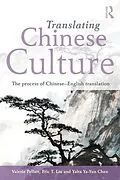Translating Chinese Culture is an innovative and comprehensive coursebook which addresses the issue of translating concepts of culture. Based on the framework of schema building, the course offers helpful guidance on how to get inside the mind of the Chinese author, how to understand what he or she is telling the Chinese-speaking audience, and how to convey this to an English speaking audience.
A wide range of authentic texts relating to different aspects of Chinese culture and aesthetics are presented throughout, followed by close reading discussions of how these practices are executed and how the aesthetics are perceived among Chinese artists, writers and readers. Also taken into consideration are the mode, audience and destination of the texts. Ideas are applied from linguistics and translation studies and each discussion is reinforced with a wide variety of practical and engaging exercises.
Thought-provoking yet highly accessible, Translating Chinese Culture will be essential reading for advanced undergraduates and postgraduate students of Translation and Chinese Studies. It will also appeal to a wide range of language studies and tutors through its stimulating discussion of the principles and purposes of translation.
Autorentext
Pellatt, Valerie; Liu, Eric T.; Chen, Yalta Ya-Yun
Zusammenfassung
Originally published in 1988, this was the first textbook to review and integrate the cognitive theories underlying the practice of modern clinical psychology. Written in a clear and readable way, it uses many clinical examples to relate the theories to what therapists actually do. It describes the strengths and weaknesses of the theories and develops a common framework drawn from research in social and cognitive psychology to explain the mechanisms of behavioural and cognitive therapy. Among the topics covered are the validity of self-reports; experimental investigations of nonconscious processes; cognitive theories of conditioning; the relation between cognition and emotional disorders such as anxiety and depression; self-esteem and the development of self-schema; self-efficacy; explanation and causal attribution; personal values and goals; self-regulation and the techniques of cognitive therapy. This textbook is designed for advanced undergraduate and postgraduate courses in clinical and abnormal psychology. Its practical focus will also make it of particular interest to practising clinical psychologists, psychiatrists and other mental health professionals.
Inhalt
Introduction-Chinese, Translatability and the Problem of Linguistic Determinism. 1. Translating modern and contemporary Chinese art and artists: art and artists as culture-specific entities 2. Chinese characters: national, cultural and personal identity 3. Calligraphy: physical and spiritual aspects of writing 4. The meaning of clothes: cultural, political and historical significance 5. The role of the Chinese nursery rhyme in disseminating traditional values in a modern world 6.Transcreation as a means of delivering poetry to an Other audience: rap adaptation and sinophonic poetry 7. Absurdity and irony in modern Chinese literature 8. Drama translation: a case study of collaborative translation 9.Translating Films Appendix Bibliography
